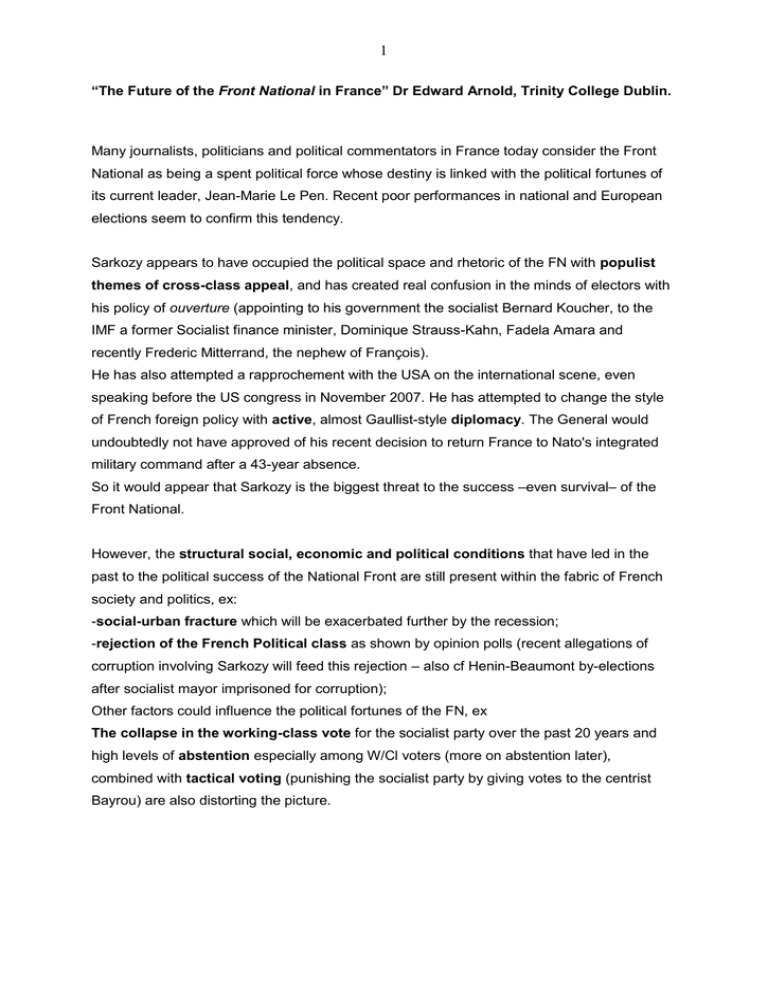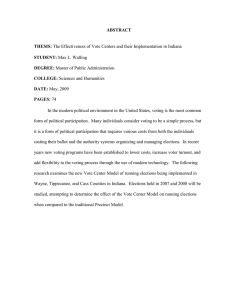1
advertisement

1 “The Future of the Front National in France” Dr Edward Arnold, Trinity College Dublin. Many journalists, politicians and political commentators in France today consider the Front National as being a spent political force whose destiny is linked with the political fortunes of its current leader, Jean-Marie Le Pen. Recent poor performances in national and European elections seem to confirm this tendency. Sarkozy appears to have occupied the political space and rhetoric of the FN with populist themes of cross-class appeal, and has created real confusion in the minds of electors with his policy of ouverture (appointing to his government the socialist Bernard Koucher, to the IMF a former Socialist finance minister, Dominique Strauss-Kahn, Fadela Amara and recently Frederic Mitterrand, the nephew of François). He has also attempted a rapprochement with the USA on the international scene, even speaking before the US congress in November 2007. He has attempted to change the style of French foreign policy with active, almost Gaullist-style diplomacy. The General would undoubtedly not have approved of his recent decision to return France to Nato's integrated military command after a 43-year absence. So it would appear that Sarkozy is the biggest threat to the success –even survival– of the Front National. However, the structural social, economic and political conditions that have led in the past to the political success of the National Front are still present within the fabric of French society and politics, ex: -social-urban fracture which will be exacerbated further by the recession; -rejection of the French Political class as shown by opinion polls (recent allegations of corruption involving Sarkozy will feed this rejection – also cf Henin-Beaumont by-elections after socialist mayor imprisoned for corruption); Other factors could influence the political fortunes of the FN, ex The collapse in the working-class vote for the socialist party over the past 20 years and high levels of abstention especially among W/Cl voters (more on abstention later), combined with tactical voting (punishing the socialist party by giving votes to the centrist Bayrou) are also distorting the picture. 2 I. INEVITABLE DECLINE? 1. Past political fortunes of the Front national Legislative elections Election year No. of 1st round votes Abstention % of 1st No. of 2nd Abstention % of 2nd No. 1st round % round round 2nd round % round of vote votes vote seats 1978 82,743 16.8 0.3 — 15.1 — 0 1981 44,414 29.1 0.2 — 24.9 — 0 1986 * 2,705,336 21.5 9.7 — PR (no 2 round) — 35 1988 2,359,528 34.3 9.7 — 30.1 – 1 1993 ** 3 153 088 30.8 12.39 1,168,160 32.4 5.9% 0 1997 3,774,266 32 14.85 1,434,854 28.9 5.70% 1 2002 2,879,068 35.6 11.4 393,205 37.9 1.85% 0 2007 1,116,136 39.6 4.29 17,107 40 0.08% 0 * Mitterrand-Chirac cohabitation 1986-88 ** Mitterrand-Balladur cohabitation 1993-95 (the Right won 485/577 seats -an 84% majority in parliament) Candidacy of Jean-Marie Le Pen in Presidential elections Election year No. of 1st round votes st % of 1 round vote No. of 2nd % of 2nd Abstention Abstention round round 1st round 2nd round votes vote % % 1974 190,921 0.8 — — 15.8 12.7 1981 — — — — 18.9 14.1 1988 4,376,742 14.5 — — 18.6 15.9 1995 4,571,138 15.0 — — 28.4 20.3 2002 4,805,307 16.86 5,525,906 17.79% 28.4 20.3 2007 3,835,029 10.44 — — 16.22 16.03 3 FN performance in European Elections Election No. of total % of overall No. of Abstention Abstention year votes vote seats won France % EU % 1984 2,210,334 11.0 10 43.28 41.02 1989 2,121,836 11.8 10 51.20 41.59 1994 2,050,086 10.5 11 47.29 43.33 1999 1,005,225 5.7 5 53.24 50.49 2004 1,684,868 9.8 7 57.24 54.33 2009 1,091,681 6.34 3 59.52 56.99 We can make a number of observations from these three tables. Up until 1981 the FN score was tiny – a third to a fifth of one percent. Le Pen personally could only muster 0.8% of the vote for the 1974 presidential elections (compared with 5.5M 18 years later). The party’s fortunes changed from 1983 and the ascension of the movement began. Whatever the kind of election, the movement obtained at least an average of 12% of the vote. Mitterrand’s decision in 1985 to introduce the party-list proportional representation system to weaken the right in the 1986 legislative elections, gave 35 seats to the FN - enough to form a parliamentary group. The re-establishment of the majority two-ballot system for the 1988 elections meant that the FN only obtained one seat in parliament despite having obtained almost the same percentage of the vote in the first round in 1986 (9.66% as opposed to 9.65% in 1986). In numerical terms, however, the FN obtained 345,808 votes less though with a considerably higher level of abstention (34.3%, up from 21.5% in 1988). Despite attracting well over 3 million votes and 13.8% of the vote in the 1993 legislatives, the FN obtained no seats in parliament. A year later in 1994, the movement won 11 seats in the European Elections with the number of votes hovering over the 2 million mark. These gains in Europe were halved in 1999 (1 million votes, 5 seats and 5.7% of the vote) Between 1995 and 2002, the FN share of the vote increased from 15% to 16.86%, which led some commentators to speak of a surge in support for the FN. However, this percentage increase represents, in fact, only a growth of 233,575 votes, or 0.82% of all valid votes cast. Jospin actually trailed Le Pen by fewer votes than that: 194,600 (or 0.68% of all valid ballots). The sensational aspect of this election is that for the first time in French history a member of an extreme-right party made it to the second round of a presidential election. Le Pen was undoubtedly helped by the fact that in the immediate post 11 Sept 2001 world the presidential campaign had increasingly focused on questions of law and order and themes of 4 insecurity, with a particular attention towards crime committed by the youth, especially of North African origin. For a turnout of 71.6 %, Jacques Chirac obtained a historic score for French presidents of 82.21% of votes cast (over 25.5M) as against 17.79% (over 5.5M) for Le Pen. This was nearly 20M more than the first round for Chirac and only 700,000 more than in the first round for Le Pen. The presidential elections of 2007 (with its record levels of turnout at 83.77%) appeared to announce the decline of the FN and Le Pen himself. As the fourth candidate behind Bayrou and his newly formed Movement democratique (on 18.57%) he obtained 3,834,530 votes or 10.44%, about a million first round votes less than in 2002. The apparent declining influence of the movement shown by this relatively poor performance seem to reinforce this conviction that the movement is destined to disappear with the retirement of the undoubtedly charismatic 81-year-old. 2. Factors of an apparent decline (2007-2009) - Internal factors Internal problems and weaknesses within the organisation seem to support the idea that the FN is “on the way out”. The advanced age of the current leader (81), the decline in the number of supporters, and the ideological and strategic divisions between the younger generation within the “national camp” have weakened the support base of the FN. Since 2005, the FN has lost control of all the Southern French municipalities it had won during the municipal elections of 1995, as the mayors have either resigned or been expelled from the party, defecting notably to de Villiers Mouvement pour la France. The strength of the FN lay, from the mid-1980s to 2005 in the capacity of the movement to bring together the different ideological and tactical strands of the “national camp”. A number of dissidents broke away from the FN in June 2008 to form a new movement, the Nouvelle Droite Populaire 1. This was seen as a symptom of a “state of dislocation” 2 within the FN. 1 The fundamental principles of the movement are as follows: 1 – Refus de l’immigration et de l’islamisation. 5 Marine Le Pen’s moves towards modernisation and “dediabolisation” of the FN and her apparent inability to effectively assert her position within the movement has, up until recently, failed to convince commentators that she could effectively preside over the movement. The daughter of the current leader seems to be moving towards a more mainstream, multiethnic conception of the nation state in contradiction to an islamophobic form of anti-Brussels European nationalism founded on regionalism and separate ethnic units. In her own words she has a more social vision of political action, that will enlarge the electoral basis of the party. She is also endeavouring to woo women voters to the movement that have always been absenty from the support base (12% of women as opposed to 20% of men). She has seen her father’s rashness and unpredictable volatility as an obstacle to establishing the movement’s credentials as a respectable party of government. During the legislative elections of 1997 he punched a female socialist mayor and candidate in the face, and was sentenced to two years ineligibility (reduced to one on appeal). This being said, no credible rival has arisen to challenge her. The electoral defeat of June 2007 exacerbated the financial problems of the FN. The headquarters of the movement since 1994, the ‘paquebot’ in Saint-Cloud, was put on the market, and even Le Pen’s armoured 605 Peugeot was put on E-bay. Twenty employees were also laid off for economic reasons at the end of April 2008, and the movement’s headquarters were transferred to Nanterre. However, Jean-Marie Le Pen has once again managed to get re-elected as an MEP (8.4%), as has Marine Le Pen (10,18%). It is interesting to note that over the past 20 years the FN has experienced much dissidence and deep splits that have not halted its rise. (Le Parti des forces nouvelles (PFN) in 1974 was an unsuccessful ten-year rebellion against Le Pen.) Within the party, Le Pen has constantly attracted criticism as a result of his autocratic behaviour and has been accused of nepotism and favouritism and using the party’s money for his own needs. The split with Megret in 1998 was over such issues, and also fundamental differences in strategy including Megret’s call for systematic tactical alliances with the mainstream right to gain power. [It is interesting to note that numerous personalities of what is today the UMP or the UDF began their political careers on the far-right, as many PS personalities began theirs in the far-left PSU. Patrick Devedjian, Gérard Longuet, Alain 2 - Défense des identités régionales, nationale et européenne. 3 - Application de la préférence nationale et européenne. 4 - Réhabilitation des valeurs familiales et des principes fondamentaux de notre civilisation. 5 - Libération des énergies individuelles, politiques et économiques. 6 - Construction d’une Europe politique indépendante et puissante, fidèle à ses racines helléniques et chrétiennes. See http://ndp-infos.over-blog.com/article-20089192.html. According to 2 See http://ndp-infos.over-blog.com/article-20089192.html 6 Madelin were all members of Occident, a neo-fascist group that existed in the 1960s. Jacques Peyrat, the current UMP mayor of Nice, was also a FN deputy elected in 1986. ] Political factors Other factors of a political nature have weakened the movement Sarkozy Many commentators maintain that former voters of the FN have been wooed by Sarkozy’s cross-class brand of populism which recuperates key themes of Frontist populist discourse. The tough stance the new President has taken on issues of law and order, immigration, national identity, and the successful heading off of the unions over public-sector pension rights have stolen the thunder of the FN, and have assimilated much of its support base into the fringes of the parliamentary right while weakening the Far Right. Even Ségolène Royal repeated this accusation after the first round of the Presidential elections when she said that Sarkozy had stolen the National Front’s ideas and themes. Between the presidential elections of 2007 and the European elections of 2009 Sarkozy’s electoral position appears to have been consolidated, and the European Elections appear on the surface to be a clear victory for, and vindication of, his politics. The apparent collapse of the socialist support base, and the defection of many socialist voters to third way solutions like Bayrou’s Modem (however temporary they have turned out to be if you look at the European Election results) have further strengthened Sarkozy’s score. After a difficult campaign marred by a number of rash outbursts, the potential kingmaker Bayrou (who dethroned Le Pen from his third place in the last presidentials) has seen his previous score of 2007 plunge by over 10% (18,57% to 8.45%, over 5.36M votes). Segolene Royal’s score of 25.87% of the vote has dropped to 16.48% in the European elections for the socialist party under Martine Aubry. The popular support basis for the Socialist party has collapsed: indeed, in 1988, the president and candidate François Mitterrand attracted 75 % of the working-class vote and 50 % of the executive and vote intellectuel. In 2007 presidential candidate Ségolène Royal could only garner 48 % of the working-class vote and 46 % of the executive and vote intellectuel. The Socialist party can no longer claim that it is the political expression of working-class aspirations. Sarkozy’s comment that he would take a Karcher high pressure hose to clean out the banlieues was a calculated attempt to woo Frontist voters by poaching on the tough law and order rhetoric of the FN. His further tirades on genetic determinism should also be seen in this light. In a journal article published just before the 2007 elections, he claimed that 7 adolescent suicides and paedophilia are genetically predetermined. As minister of the interior he has already shown his “social darwinistic” leanings with the “Domestic Security” law of March 18th 2003. Indeed a French magistrate noted “Under this law, prostitutes, beggars, the homeless and youths from the suburbs are punished as though they are delinquents, thus turning penal violence back on the victims of social violence”. In 2004, he proposed a “Prevention of delinquency” law that promoted the principle of an “early detection of behavioural problems which may lead to delinquency”. His calls to liquidate the "immoral heritage of 1968” undoubtedly appeals to the sensitivities of many FN voters and sympathizers. Sarkozy has promised to break with the "cynicism" of the "gauche caviar", whom he blamed for a crisis of "morality, authority, work and national identity". These four themes have been pivotal preoccupations of the French extreme right for a century. During the riots just before the presidential elections of 2007, summoning memories of the student revolt of 1968, he condemned the Left for instinctively backing troublemakers rather than the police. Days before the second round he announced: "In this election, it is a question of whether the heritage of May '68 should be perpetuated or if it should be liquidated once and for all." Sarkozy’s policy of ouverture also erodes and even poaches support from the left. The appointment of the socialist Bernard Koucher as Foreign minister, of Dominique Strauss-Kahn, a former Socialist finance minister, to the IMF has blurred ideological lines between left and right in France. Among the several other figures on the left who have succumbed to Sarkozy's powers of persuasion are a former socialist foreign minister, Hubert Vedrine - tasked with drafting a report on globalization - and Jacques Attali, a one-time senior adviser to François Mitterrand - working on a government report on the reform of development aid. Jack Lang, a former socialist culture then education minister, was initially offered -and refused- the Ministry of Culture on the Sunday of the second round of the presidential elections in 2007. He accepted the president's invitation to join his committee on modernizing France's institutions. Eric Besson the former economic spokesman for the PS who worked for S. Royale’s election campaign, defected spectacularly on the evening of the first round of the presidentials in 2007, proclaiming that he felt the Socialist campaign's economic policy to be deeply flawed. He was appointed Minister of Immigration, Integration, National identity and Solidary development in January 2009.. The unlikely former chiraquian, Frederic Mitterrand, the nephew of president François, was a significant propaganda coup for Sarkozy when he agreed last week to accept the Culture portfolio. What the Economist has called the President’s “leftish-sounding rhetoric” is reinforced by his references to socialist and communist icons such as Jaurès and Guy Moquet. 8 In recent months, a new brand of French conservatism that promotes France on a European and global level is emerging. The “Sarko-show” of the early period has given way to a Gaullist-style activism in both domestic and foreign policy in reaction to unprecedented economic crisis and collapse,. France under Sarkozy has returned France to Nato's integrated military command after a 43-year absence and is sending troups to Afghanistan. Combined with the apparent implosion of the parliamentary Left confirmed by the recent European elections and the historically low levels of support for the radical left, it would appear that the stage is clear for the consolidation of a new right, Sarkozism, which leaves little political space to the National Front. Emmanuel Todd (Apres la democratie, 2008) sees Sarkozy’s behavioural patterns as a reflection, a mirror image of a deep crisis that France is going through: ideological incoherence, intellectual mediocrity (reflecting a stagnation of the education system); aggressivity (“casse-toi pauvre con!”), love of money, emotional and family instability. The vote for Sarkozy was thus an inevitable subconscious expression of a crisis of democracy, and proves that France is ‘ill’. The decline in parties outside of the system ( “hors système”) The decline in support for the FN is a symptom of an apparent return of electors to government parties. In the 2007 presidentials, votes for far left movements were historically low. The Communist Party represented for the first time by a woman, Marie-George Buffet, received 1.9 percent, the Green Party’s candidate Dominique Voynet did even worse with 1.6 percent. Arlette Laguiller, who was running for her sixth presidential campaign, got only 1.4% which represents a quarter of her previous vote. Anti-globalisation candidate José Bové received 1.3 percent, and Parti des Travailleurs candidate Gérard Schivardi got 0.3 percent. Only Olivier Besancenot of the Ligue Communiste révolutionnaire (LCR), the radical left, fared better with a score of 4.2 percent of the vote. In the 2009 European elections, Besancenot with his recently formed Nouveau Parti anti-capitaliste marginally improved his score to 4.88%. The main surprise was the Green/Jose Bove alliance (Europe Ecologie) that swept up 16.28% of the vote. So the future of the Front National looks grim. HOWEVER... 2. RENEWAL ? The conditions that have led in the past to the political success of the National Front are still present within the fabric of French society and politics. 9 1. Social crisis and urban fracture The social and urban fracture will be exacerbated by the recession that is on the horizon, and much higher levels of unemployment which have fed frontist success in the past are inevitable. Voir l’article de Hugues Lagrange, Emeutes, rénovation urbaine et aliénation politique, Revue française de science politique, juin 2008. INSECURITE (cf le “tripotage” des statistiques sur la délinquance révélé récemment) et consacrer quelques lignes à la pénétration des musulmans français par les islamistes radicaux. Political crisis The municipal elections of March 2008, while avoiding a crushing defeat for the UMP, were clearly cracks appearing in the veneer of the superpresident. Good scores by the FN in towns like Roubaix are showing that the FN has maintained a popular basis to its vote. In the 2009 European elections, the collapse of the working-class vote for the PS led to a drop of 10% down to 16.48%. There has to be a doubt as to whether the UMP result in these elections can really be said to have been a vote of confidence in the government and its policies. Few "European" issues were addressed during the campaign no matter how much "spin" is put on the results, and Sarkozy’s domestic popularity remains low (depending on the poll 54-57% do not trust him to resolve France’s problems, 41-44 % do – the highest level for many months). There is clear crisis on the Left, and a potential crisis on the right. A continual rise in levels of abstention is significant for the future of the FN The latest elections for the European parliament recorded the highest level of abstention ever recorded, 59,52 %. According to recent opinion polls (TNS Sofres/Logica-le Monde), among working class voters, this figure increases significantly. 69% of workers and 66% blue-collar workers did not vote. Age as well as class also has an effect on abstention: 70% of the18-24 age bracket and 72% abstained from the 25-34 bracket. 64% abstained for the 35-49 age bracket. This reduces to 42% for the 65s and above. Shopkeepers, artisans, and owner-managers of small companies abstained massively at 77%. 10 Other research by the CEVIPOF has confirmed that this age-related trend is the case for all elections. There is always a difference of 10% between abstention of the young and abstention of the rest of the population. During the recent European Elections, it is clear that most of the student electorate that represents 13% of the electorate did not go to the polling stations, whereas those students who voted chose parties with strong European convictions like the Green Party. This explains the success of the Cohn-Bendit list. It is clear from opinion polls that the main victims of the recent abstention in the European elections are the extreme-left (68%), the MoDem (66%) and the National Front (65%). The reasons for this abstention are varied. Only 20% are expressing their dissatisfaction on European construction, and 31% of this fifth are “punishing” political parties. The Conjunctural reasons for Sarkozy’s success In addition, the tactical nature of voting in France was partly responsible for giving Sarkozy his victory in 2007. His score was hardly what could be described as a landslide (53.06%, or 2,192,698 votes more) His victory can be partly interpreted as an attempt to punish establishment figures, and to sanction the parliamentary Left for its failure to -win a third consecutive presidential election and to -prevent the apparent implosion of the parliamentary and radical left. This dynamic also explains support for the centrist Bayrou. In the first round of the presidential elections, Sarkozy failed to make inroads among the youngest voters and unskilled manual voters. Some of his policies towards young people in the banlieues and his support for what is seen to be high-handed police tactics against these groups have been seen to exacerbate tensions within French society. His attacks on republican values and an ambiguous attitude on separation of church and state is seen as an apparent promotion of communitarianism. The rejection of the French political Class Regular opinion polls show the low levels of trust and esteem for the political class in France. The response to specific questions like “are politicians corrupt?” are invariably affirmative, as are questions on motives of politicians. Historically, the political fortunes of Le Pen were helped by the numerous scandals that were revealed from 1986 onwards, on both the parliamentary left and right, and the unpopularity of the political system. Cf Sarkozy’s possible involvement in the siphoning off of money from 11 arms deals in Pakistan for Balladur’s campaign in 1995 (led to the murder of 11 French workers in Pakistan). Social crisis/fracture, abstention, tactical voting, the rejection of the political class are issues among others that have fed dissatisfaction with what Le Pen has called “l’établissement”. Given the right context of societal dislocation and crisis, these issues account for the past success of the Front National as a political force. The troubled economic times that we are now living in can quickly erode the enthusiasm for new political modes such as Sarkozyism. Nicolas Sarkozy’s take-over bid on the NF voters has globally succeeded, though crucially not in all sections of society as shown by the profile of abstentionists. According to a recent survey (Univ. Rouen and Ifop 25/06/2009), even if the right-wing electorate (middle classes, commercants and artisans, directors of small firms) has been attracted to the tough law and order themes of the President, the working-class electorate has remained faithful to the FN. According to the specialist on the FN Pascal Perrineau, one third of the working-class voted FN from the late 1990s at the height of the movement’s success (up to 16% of the vote). This has potentially extremely disruptive implications should the 69% of working-class abstainers become politically mobilized again on themes of anti-corruption, and in the case of severe economic crisis, on themes of protection of French workers against foreign competition. In addition, the electoral landscape has evolved. During the 1980s the centre of gravity for the frontist vote was in the south of France. By the mid 1990s it had moved to the North West industrial heartlands that had been hit hard by industrial restructuring and closures. The new centre of gravity is now clearly in the Nord-Pas-de-Calais and Picardie regions. In the European elections the highest FN score was in the Aisne department (13,4%), in the Pas-de-Calais (12,9%), followed by the Oise (12,4%) and la Somme (12%). It is clearly not a coincidence that Marine Le Pen decided to stand in the Pas-de-Calais region where she was number one on the lists in most constituencies. In the recent European elections her final score was 10,18 %, and her father Jean-Marie Le Pen got 8,49% in the south-east. The potential strength of the movement can be seen by success of FN candidates in legislative runoffs, three-way races, called triangulaires. Last Sunday 28th June in Hénin-Beaumont (Pas-de-Calais) a working-class town of 25,000 inhabitants, the Front National list headed by Marine Le Pen received 39.34% of the vote in the first round. Her campaign slogan was “tous pourris”. The divers gauche candidate (independent, unaffiliated left wing candidate) came second with 20.19% of the vote, the 12 Union de la Gauche list led by a young inexperienced 27-year old socialist candidate and supported by the MoDem won 17.01%, the Greens 8.52%, and the government list led by a former socialist, turned sarkozyist of north African origin, only attracted 4.34% of the vote. The turnout was 60.15% according to the Prefecture. The Front National could win in the second round of the elections on the 5th July if the Left does not unite and a triangulaire takes place. The divers gauche candidate has called for a Republican Front. A win for Marine Le Pen would also strengthen her chances of inheriting, and attempting to modernise the NF, when her father retires in the next two to three years. Her main rival for the leadership of the movement is the negationist Bruno Gollnisch who represents the reactionary, catholic tendencies within the movement. Electoral stand-offs like Henin could become more frequent in a context of worsening economic conditions. Bibliography: Shields, James, The Extreme Right in France: From Pétain to Le Pen, Routledge, 2007, 224 pages Birenbaum, G., Le front national en politique, Balland, 2006, 358 pages Atkin, Nicholas and Frank Tallet (eds.), The Right in France: From Revolution to Le Pen, I.B.Tauris, 2003. Duclert, Vincent and Christophe Prochasson, Perrine Simon-Nahum (eds.), Il s'est passé quelque chose le 21 avril 2002, Paris : Denoël, 2003, 268 p. Davies, Peter, The Extreme Right in France, 1789 to the Present: From De Maistre to Le Pen, Routledge, 192p. Pascal Perrineau, Le Symptôme Le Pen. Radiographie des électeurs du Front national. éd. Fayard, Paris, 1997. Le vote de rupture : Les élections présidentielle et législatives d'avril-juin 2007, Les Presses de Sciences Po, 2008 Dobry, Michel (ed), Le Mythe de l'allergie française au fascisme, éd. Albin Michel, 2003. 13 Remond, Rene, Les Droites aujourd'hui, éd. Audibert, 2005. Brian Jenkins (éd.), France in the Era of Fascism. Essays On The French Authoritarian Right, Berghahn Books, 2005, p. 201. Paxton, Robert O., Le Fascisme en action, éd. du Seuil, 2004.





